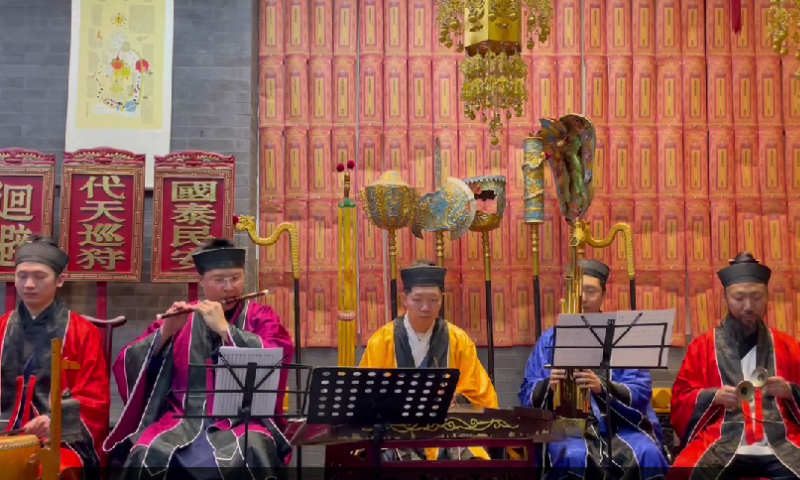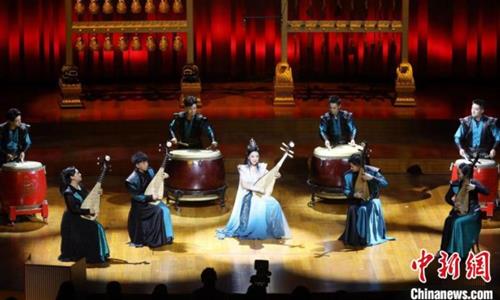ARTS / MUSIC
Tianjin Taoist Orchestra finds innovative twist on traditional music

Photo: Courtesy of Tianjin Taoist Orchestra
There is no show on earth quite like the Tianjin Taoist Orchestra. Launched in 2003, the orchestra performs interesting and innovative modern songs in the form of Chinese Taoist music.
Not all the musicians are Taoists, but they came together through their love of music. They play traditional Taoist music and use instruments such as a flute, sheng (a free reed pipe wind instrument), guzheng, pipa, yangqin and other Chinese ethnic instruments to perform familiar classics and newer music as well, such as Ryuichi Sakamoto's Merry Christmas Mr. Lawrence and Jay Chou's Blue and White Porcelain, Happy Birthday to You and Doraemon.
The sheng originated as an ancient Chinese wind instrument. It was the first instrument in the world to use free reeds and was influential in the development of Western instruments. The sound of the sheng is elegant, soft and melodic, with a Chinese folk mood.
"When adding the sheng and percussion into music, the whole musical atmosphere becomes ethereal and fairy-like," Taoist master Lu, a director of the Tianjin Taoist Orchestra, told the Global Times on Sunday.
A video of the orchestra performing has won wide applause from millions of netizen after the video was published by Douyin, Bilibili, Little Red Book and Weibo, and the orchestra has gained many fans on various web platforms in the last year.
"I feel like a fairy, my heart is quiet," said one netizen. "Listening to the songs played by the orchestra, it feels like I'm coming to the Peach Festival."
Interesting form
At first, the Tianjin Taoist Orchestra played traditional Chinese Taoist music such as Tianheshui, and Gong Tin Le. "I found that the audience seemed to have relatively little knowledge of traditional music and the target audience was a bit narrow, although the video received a lot of airtime," Lu told the Global Times.
Lu said that when the repertoire was changed to include modern pop songs such as Chinese cartoon song Pleasant Goat and Big Big Wolf and Japanese cartoon Castle in the Sky, the number of plays increased much more than in the past.
Taoist master Lu loved anime as a child. "I had an interesting idea which is combining anime songs with Taoist music. It might be able to collide with many interesting sparks and it is a new form of traditional music development," he said.
"It was an interesting show and I had a sense of floating like a fairy," a netizen named "Xiao Guan Ju" wrote in a comment under the video, which received tens of thousands of likes.
"So far, we have six fan groups on Douyin, and already have nearly 400,000 followers on various websites," said Lu.
"As well as Chinese modern songs, we also play foreign songs, like the Japanese song Merry Christmas Mr. Lawrence, and we received a lot positive comments once the video was broadcast," Lu told the Global Times.
"We would like to redefine Chinese traditional music with a relatively new interpretation. It is a collision and friction, and has attracted a lot of attention. People like this form of performance," he added.
Traditional but creative
"Our main part should be the traditional culture, while adding a new kind of innovation on top of that," said Lu.
After the Tianjin Taoist Orchestra sparked attention on the internet, many people have wondered if it is strange for Taoist music to be played in such a trendy way.
"We are exploring the infinite possibilities of traditional folk music," Lu said. "We still collect and organize the ancient texts of traditional Taoist music to play them. But in the current internet age, if there is a way to make more young people understand and enjoy our traditional music, why not?"
Lu told the Global Times that he hoped to promote folk music "outside the circle," saying it can not have influence if people just maintain the status quo.
"I think for the Tianjin Taoist Orchestra to play in such an interesting, contrasting form, it can help more people, especially young people, to better understand traditional Chinese culture and Chinese folk instruments, so that the excellent Chinese culture can be promoted."
Lu said that they hope to continue to combine popular styles with folk music forms and make innovative changes to keep people interested in traditional music in the future.

